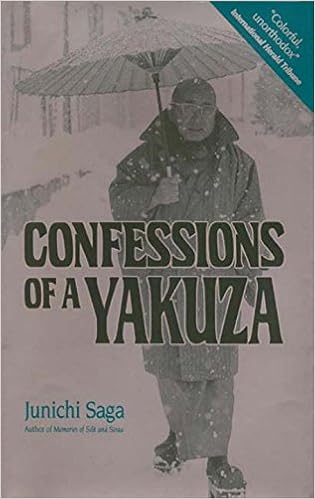
Description
"Vivid and accurate." — Los Angeles Times "A wonderful storyteller with a variety of unusual experiences." — Washington Post Book World "Packed with colorful details and insights, told straightforwardly without machismo or exaggeration... Important and entertaining." — Manoa "This is the kind of history that rarely gets recorded... Interesting, candid, and honest." — Far Eastern Economic Review "Memories of pain and pleasure…a witness to the past." — Le Monde "Fascinating ... gang hierarchy, the relationship between the police and the mob, the organization of gambling sessions and of prison life." — Quadrant "Compelling…big-hearted."— International Herald Tribune Dr. JUNICHI SAGA is a medical doctor with a general practice in Tsuchiura, Ibaraki Prefecture, on Lake Kasumigaura. He began taping his elderly patients' reminiscences about thirty years ago when he realized what a wealth of detail and information they contained. He has published numerous works oflocal history and ecology, two of which are available in English: Memories of Wind and Waves and Memories of Silk and Straw . In his spare time he does ink painting.JOHN BESTER, the translator, is one of the foremost translators of Japanese fiction. In 1990 he was given the first Noma Award for the Translation of Japanese Literature, for his English version of a short-story collection by Yukio Mishima entitled Acts of Worship . Excerpt. © Reprinted by permission. All rights reserved. From "Eloping" in Part II I went with her as far as Koiwa, then went on alone to Funabashi, found an eating place where they knew me, and asked them to lend me a kitchen knife. "Haven't seen you for ages, Eiji," said a cook with a cotton towel bound neatly around his forehead. "What do you want it for?" "I'm going to use it here, so don't worry. I'll give it back to you right away." He gave me the knife. I held one end of a bit of string I'd brought with me between my teeth, got hold of the other end with my right hand, and tied it around the little finger of my left hand. I pulled it as tight as I could. Then I chopped off the tip of the finger. The cook just stood there gawping, but it hurt too much for me to bother about him. I cut off one end of the clean white cotton of my bellyband, bound up the finger, then asked him for a sheet of paper. I wrapped the bit of finger in it, and left. I wasn't at all sure that cutting off a finger would be enough to make them let me off, but there wasn't any other way by now. So I set out for Makuta's place in a sort of what-the-hell mood. When I called out in the entrance, a maid came out, and a young man with her. I introduced myself and said I'd come to apologize, and held out the finger, still wrapped in its piece of paper. "Just wait there a second, will you?" the man said, and disappeared inside the house. I didn't know whether Makuta was in or not, but I could hear women talking at the back of the house. My hand by now was throbbing like hell, and my kimono was soaked with clammy sweat. After a while the same man came out again and said, more politely than I'd expected, "The boss says he understands. Now will you please leave?" "I see," I said. "I'm much obliged." And I bowed and left. It all went off so simply that I felt kind of let down. After that, I went straight back to Asakusa. On the way, I kept wondering why he'd made so little fuss, but I couldn't make any sense of it. So I assumed my boss must have done the apologizing for me. The boss was back in town by then. He glanced at me when I showed up, and said, "Mind you take yourself a bit more seriously from now on." And that was all he ever said about it. Read more
Features & Highlights
- This is the true story, as told to the doctor who looked after him just before he died, of the life of one of the last traditional yakuza in Japan. It wasn't a "good" life, in either sense of the word, but it was an adventurous one; and the tale he has to tell presents an honest and oddlyattractive picture of an insider in that separate, unofficial world.In his low, hoarse voice, he describes the random events that led the son of a prosperous country shopkeeper to become a member, and ultimately the leader, of a gang organizing illegal dice games in Tokyo's liveliest entertainment area. He talks about his first police raid, and the brutalinterrogation and imprisonment that followed it. He remembers his first love affair, and the girl he ran away with, and the weeks they spent wandering about the countryside together. Briefly, and matter-of-factly, he describes how he cut off the little finger of his left hand as a ritual gesture ofapology. He explains how the games were run and the profits spent; why the ties between members of "the brotherhood" were so important; and how he came to kill a man who worked for him.What emerges is a contradictory personality: tough but not unsentimental; stubborn yet willing to take life more or less as it comes; impulsive but careful to observe the rules of the business he had joined.And in the end, when his tale is finished, you feel you would probably have liked him if you'd met him in person. Fortunately, Dr. Saga's record of his long conversations with him provides a wonderful substitute for that meeting.





